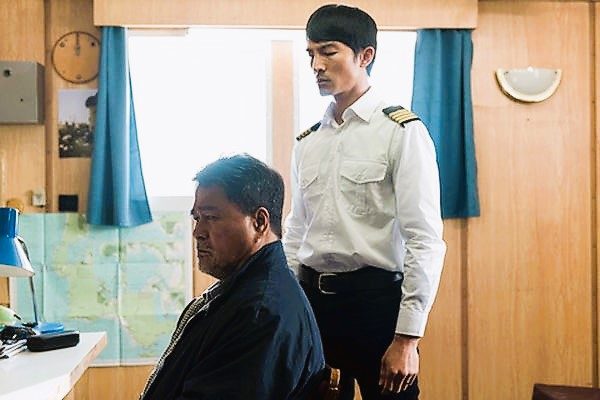SUMMARY
This is AI generated summarization, which may have errors. For context, always refer to the full article.

Spoilers ahead.
The first thing you will know about To The North is that it is based on a real-life account set in the open sea in the spring of 1996.
But that’s about it, because what follows is an introspective drama that thrives on ambiguity and keeps you guessing through and through, like a mad scientist about to crack a stubborn code, only to uncover yet another set of codes.
The story centers on the Romanian Dumitru (Nikolai Becker) and his close Bulgarian pal Georgi (Dimitar Vasilev), two stowaways hiding behind rows of containers on a transatlantic ship they’ve mistaken as heading to the United States when it is actually departing for Canada. They dream of forging a new path in American land, no matter the cost – a cost that one of them would have to endure early on as Georgi gets killed and thrown overboard by the Taiwanese captains lording over the vessel – or at least that’s what the film implies.
Filipino sailor Joel (Soliman Cruz) knows that it is not an isolated case. So when he learns about the other clandestine passenger, his rock-solid faith is put to the test. He hides Dumitru in the engine room under the ship, discreetly feeds him, and resolves to take him to Canada within four days, setting in peril the lives and jobs of his fellow Pinoy migrant workers.
Joel’s response is his way of standing against the imbalance of power on the ship, forever changing the course of his fate. The film’s setting makes apparent such a dynamic. Like the megayacht in Ruben Östlund’s Triangle of Sadness, the vessel in To The North becomes a tricky domain of power that keeps afloat every character’s motivation – a space where every move requires perfect calculation, where decisions are murmured in between meals or in dark corners amid the ship’s interior mechanics, and where the language barrier is taken as a trump card to outplay each other.
Yet the thrill of the film does not anchor on this cat-and-mouse setup but on the enigma that is Cruz, who, despite his steady presence in the local entertainment industry, has never been the center of attention. So when the actor finally gets his due and lands the lead role, he does not waste it. Cruz makes wise use of his arsenal to make one revel in every moment he’s in, evident in how his acting evokes a quiet intensity that makes for a pensive underdog character.
But the film is far from a hero’s odyssey. Joel is tethered to a spiritual crossroad, and extending a hand to Dumitru is part of navigating that commitment to his foundational beliefs, especially as the stowaway himself is also a man of faith. He often talks in cryptic, philosophical language, even when tensions run high. For instance, when Dumitru begs him to keep the lights on before leaving the Romanian in the cramped, pitch-black engine room, Joel suddenly goes into a religious litany about embracing darkness, which, in hindsight, comes off as rather campy and hilarious.
Director Mihai Mincan creates this air of ambiguity and a narrative chess game by employing sedate, close-up shots juxtaposed against his characters’ manner of speaking (dialogues linger precisely because of the sheer time the film allots to deliver them). Images often tap into the, for lack of a better word, slowness of the whole thing (at times, to a fault).
This tone is complemented by Marius Leftarache’s meditative score and George Chiper’s economical cinematography that knows exactly how to contain and trap the characters in this “unwelcoming territory made of steel and narrow passageways,” as this review noted, surfacing how such spaces inform everyone’s next tricks, especially when the main plan goes awry.
At its core, To The North is yet another cinematic rendering of the plight of generations of overseas Filipino workers, who are forced to embark on foreign lands in search of greener pastures, uncertain of the future that awaits them. Because in a country like the Philippines that has long been enduring a crisis after crisis, success often means departure. So one understands why the rest of Joel’s crew feels reluctant to commit to the task of helping a stranger and why they eventually turn their backs on him. They’d rather break their moral compass than take the risk and leave their families hungry at home.
In retrospect, it’s almost ironic to think how Cruz gambles on a significant career move and makes it big outside the country, conveying how Filipino talents can stop at nothing if given enough space and opportunity.
And this shot at opportunity is the very thing that the willful Dumitru hopes to stumble upon, never mind the looming reality that befalls him. So after learning that he’s no longer disembarking in Canada and has to brave through the cold, deep water in order to survive, Dumitru refuses to drown in the situation and takes matters into his own hands. And when things don’t work his way, he doesn’t bat an eye, even when he’s already crossing a line.
In the film’s final and most devastating moment, Dumitru, covered in blood, faltering and laboriously breathing, ponders on his ever-grand American dream and its hollow promise – how he wishes to turn the tides, how he refuses to cave in to fate. Joel says he will die on the ship, but Dumitru believes otherwise. He will survive, he assures himself. The end is near, but the north still seems like a vanishing point. – Rappler.com
To The North was the closing film at the recently-concluded QCinema International Film Festival.
Add a comment
How does this make you feel?
![[Only IN Hollywood] The irony of Soliman Cruz, Dolly de Leon getting their breaks in foreign films](https://www.rappler.com/tachyon/2022/09/soliman-dolly.jpg?fit=449%2C449)
There are no comments yet. Add your comment to start the conversation.